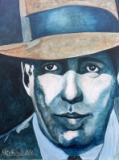Boxers
Boxing great Henry Armstrong hammered away at discrimination in the 1930s and 1940s by refusing to fight in segregated arenas.

Jack Johnson nicknamed the “Galveston Giant”, was an American boxer, the second African American Boxing Champion, and the first African American world heavyweight boxing champion. Johnson's dominance over his white opponents spurred furious debates and race riots in the early 20th century. Jack Johnson is still considered one of the best, most powerful counter-punchers who ever stepped in a ring. Once he won the Heavyweight Title, he would not relinquish it for more than six years.
John Arthur Johnson was born in Galveston, Texas, the third child and first son of Henry and Tina Johnson on March 31, 1878. Jack Johnson dropped out of school after the fifth grade working odd jobs until he was able to get a job as a dock worker in Galveston. Jack Johnson first started boxing as a sparring partner and fought in the "battles royal," matches. The Battle Royal's typical form called for six black men to fight each other. The last man standing was the winner. Battles Royal were started in the deep South using slaves and the slave owners kept the money. Although some of these fights were fought legally with gloves in the 1930s, most bouts in this period were fought illegally as unsanctioned and unregulated boxing matches, as preludes to the main event. Almost all fighters at these contests, both legal and illegal, were still African-Americans, although they were now allowed to keep their winnings.
Continuing to fight in private clubs, Jack Johnson turned pro in 1897. Living in the Jim Crow era of the South made life difficult for Johnson and things were made worse when his family home was destroyed in the 1900 Galveston Hurricane. In 1901 Jack Johnson was arrested and jailed for boxing and decided to leave Galveston for good, moving to California, He pursued his boxing career with a passion fighting other African Americans and taking fights against white boxers when he could get them.
Johnson's boxing style was very distinctive. He developed a more patient approach than was customary in that day: playing defensively, waiting for a mistake, and then capitalizing on it. Johnson always began a bout cautiously, slowly building up over the rounds into a more aggressive fighter. He often fought to punish his opponents rather than knock them out, endlessly avoiding their blows and striking with swift counters. Jack Johnson always gave the impression of having much more to offer and, if pushed, he could punch powerfully, often toying with his enemy.
By 1902, Johnson had won at least 50 fights against both white and black opponents. Johnson won his first title on February 3, 1903, beating "Denver" Ed Martin over 20 rounds for the World Colored Heavyweight Championship in Los Angeles. His efforts to win the full title were thwarted, as world heavyweight champion James J. Jeffries refused to face him. While black and white boxers could meet in other competitions, the world heavyweight championship was considered sacred and off limits to African Americans. However, Johnson did fight former champion Bob Fitzsimmons in July 1907, and knocked him out in two rounds.
Jack Johnson was relentless in his quest to fight for the heavyweight title. For two years Johnson traveled around the world publicly taunting the reigning champion Tommy Burns who had been awarded the title when James Jeffries had retired undefeated. Jack Johnson was finally given his opportunity and won the world heavyweight title on December 26, 1908 in Sydney. Australia. The fight lasted fourteen rounds before being stopped by the police in front of over 20,000 spectators. The title was awarded to Johnson on a referee's decision as a T.K.O, but he had clearly beaten the champion.
Jack Johnson's victory caused an uproar in the white boxing community and the call was soon put out to find the "great white hope" to regain the prized heavyweight title. After defending his title against numerous white opponents the former heavyweight champion James Jeffries decided to come out of retirement and try to win back the title for the white race. The fight took place on July 4, 1910 in front of 20,000 people, at a ring built just for the occasion in downtown Reno, Nevada. Johnson proved stronger and more nimble than Jeffries. In the 15th round, after Jeffries had been knocked down twice for the first time in his career, his people called it quits to prevent Johnson from knocking him out.
The "Fight of the Century" earned Johnson $65,000 and silenced the critics, who had belittled Johnson's previous victory over Tommy Burns as "empty," claiming that Burns was a false champion since Jeffries had retired undefeated.
The aftermath of Johnson's victory was felt all over the United States. Proud African Americans cheered the fact that Jack Johnson had silenced all the hecklers and proved African Americans could be champions in even the heavyweight class. Whites were angered and embarrassed by the results of the match and race riots broke out in many cities. Many whites were also upset with Jack Johnson's lifestyle. Johnson was often seen with some of the era's most desired women, most of them white. Moulin Rouge star Mistinguette, German spy Mata Hari, Sex symbols Lupe Velez and Mae West, were all romantically linked to Johnson.
After defeating Jeffries, Jack Johnson didn't fight for two years, but he made waves out of the ring. In January 1911, he married for the second time. The bride was Etta Duryea, a white divorced woman from high society. The marriage ended tragically only eight months later, when Duryea committed suicide. Less than three months later, on December 4, 1912, Johnson married another white woman, Lucille Cameron. After Johnson married Cameron, two ministers in the South recommended that Johnson be lynched and racists looked for a way to punish Jack Johnson. In 1912, Jack Johnson was convicted of violating the Mann Act by transporting Lucille Cameron across state lines before their marriage and was sentenced to a year in prison. While out on appeal Jack Johnson escaped fearing for his safety. Posing as a member of a black baseball team, he fled to Canada and later Europe. Jack Johnson remained a fugitive for seven years. Johnson defended his heavyweight championship three times in Paris before his fight to Jess Willard.
On April 5, 1915, Johnson lost his title to Jess Willard, a working cowboy from Kansas who started boxing when he was twenty-seven years old. With a crowd of 25,000 at Oriental Park Racetrack in Havana, Cuba, Johnson was knocked out in the 26th round of the scheduled 45-round fight. Responding to speculation that Jack Johnson had thrown the fight Jess Willard said "If he was going to throw the fight, I wish he'd done it sooner. It was hotter than hell out there".
President Donald Trump has been quoted as saying that he is considering granting a posthumous pardon to boxer Jack Johnson on the advice of actor Sylvester Stallone.
Don't miss a single page. Find everything you need on our complete sitemap directory.
Listen or read the top speeches from African Americans. Read more
Read about the great African Americans who fought in wars. Read more
African Americans invented many of the things we use today. Read more
Thin jazz, think art, think of great actors and find them here. Read more
Follow the history of Black Americans from slave ships to the presidency. Read more
Olympic winners, MVPS of every sport, and people who broke the color barrier. Read more
These men and women risked and sometimes lost their life to fight for the cause. Read more
Meet the people who worked to change the system from the inside. Read more

Visit my RedBubble page and use Michael Arnold Art to create greeting cards, T-shirts, mugs, and more.

The variety and impressive numbers of mammals, birds and marine wildlife in Alaska draw visitors from all over the world. For some travelers, Alaska is wilderness, at least compared to what they may know from back home. The pristine wilderness of Alaska is, perhaps, the last vestige of thriving populations of North American wildlife. Where else can you see polar bears, bald eagles, blue and humpbacked whales, gray wolves, grizzly bears, orcas, lynx, moose, and hundreds of other rare and endangered species in their original and undisturbed natural habitats?

Enjoy our website filled with original signed acrylic paintings by award winning Artist Michael Arnold. Located in Citrus County Florida, Michael Arnold is a the editor at the Citrus County Chronicle. When he's not busy being an editor, he is an avid artist who enjoys painting in a variety of styles. We hope you take the time to click on each image to see a larger view and to learn what the artist, Michael Arnold has to say about his paintings.

As dog owners and people who care deeply for animals and wildlife, we wanted our Dog Encyclopedia to be a website that could empower pet owners to create the most positive, loving environment for their dogs. Dog Encyclopedia realizes that owning a dog is like adding a new member to your family.

Floridian Nature has everything your are looking for in Florida nature. The wildlife of Florida is rich and varied, yet most of us are familiar with only a dozen or so species: the "well known endangered species such as manatees and panthers; those, like raccoons and squirrels, that have adapted to urban environments; the frightening alligators and black bears; and those like the armadillo who can't seem to cross the road. Yet they are just a few of the many animal species found in Florida.
